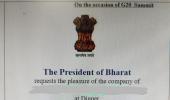With changes to Delhi's architectural map, a re-naming rash, and more Hindu symbolism in secular spaces, the government is making it clear it wants a clean break with post-colonial India, asserts T N Ninan.

Towards the end of his first term in office, Prime Minister Narendra D Modi said his regret was that he had not been able to win over Lutyens Delhi -- the usual short-hand for India's version of the Establishment, or entrenched (mostly English-speaking) elite.
Now, approaching the end of his second term, what Mr Modi has been able to do is not so much win over the Establishment as displace it, as part of the larger plan to re-make the nation, not just the capital city.
At the Delhi end of this larger effort, there is the capture or demolition of the habitats of the old elite.
Think-tanks and various civil society outfits inclined to do their own thing have been squeezed dry of funding or are manned by people oriented towards the government's ways of thinking.
Others have been asked to have government people on their boards and on their discussion panels.
The Gymkhana Club (whose members had converted it into a closed club open only to their own progeny) is now administered by the government.
Jawaharlal Nehru University has been placed in the successive care of vice-chancellors who would change its character if they could, while the liberal education-imparting Ashoka University has been taught the limits of liberalism.
School textbooks are being rewritten, while a recalcitrant 'baba-log' TV station has been bought by a friendly businessman.
One could argue that this is less a story of Lutyens Delhi being invaded by Bharat, as capture by the State.
Still, it does include restating the dominant 'Idea of India'.
Through changes to Delhi's architectural map, Hindi names for new laws, a renaming rash and increasing the space for Hindu imagery and symbolism in secular spaces, the government is making it clear that it wants a clean break with the language and idiom of post-colonial India, and the birth of a more culturally rooted 'new India'.
Correction, new Bharat -- though since 'India' and 'Hindu' have the same linguistic origin overseas, one wonders about the implications of the name change.
The issue goes beyond name change, regime change, and identity politics.
What is being advanced is a challenge to the notion that the European Enlightenment produced ideas with universal validity, such as individual freedom, equality, and the broader 'Rights of Man', drawn up during the French Revolution and reflected 150 years later in the United Nations' Universal Declaration of Human Rights.
India's Constitution through its listing of Fundamental Rights reflects those Enlightenment values.
But thinkers in Russia (like Aleksandr Dugin, reputedly a Putin favourite) and elsewhere have posited Western universalism against populist nationalism, and individual rights against the collective good.
The argument is that universalism seeks to eliminate cultural differences; the counter would be that liberalism provides a way to deal with those differences.
Cultural relativism is naturally attractive to many tradition-bound elites, even though no one now advocates 'Asian values'.
The problem is that the beauty of culturally rooted political systems lies often in the eye of the beholder.
Tamil Nadu politicians have just attacked the traditional hierarchies of the sanatan dharma.
China would like the Confucian idea of harmony flowing from an ordered hierarchy to prevail in international relations; smaller countries in the region might object to such hierarchical ordering.
Meanwhile, the consequences of Vladimir Putin's understanding of Russian and Ukrainian history, culture, and identity are on display right now.
When one looks for culturally rooted solutions or systems, one should be careful where it might lead.
If one turns to the Inglehart-Welzel cultural map of the world, pictured along two axes (worldvaluessurvey.org) (external link), India has reversed the 'natural' transition from traditional to secular-rational values, and is focused on survival values (often linked to an ethnocentric outlook) as different from self-expression values.
This analytical framework could explain why the Modi government's cultural push is likely to strike a chord with those who are not part of a self-actualising elite.
But India is never free of contradictions.
Pew Research reported from a 2017 survey that while the overwhelming majority of Indians valued democracy, the majority also favoured autocratic, strong-man rule and even military rule.
So Mr Modi, very much the strong leader, talking of the 'mother of democracies' is pitch-perfect.
Feature Presentation: Aslam Hunani/Rediff.com











